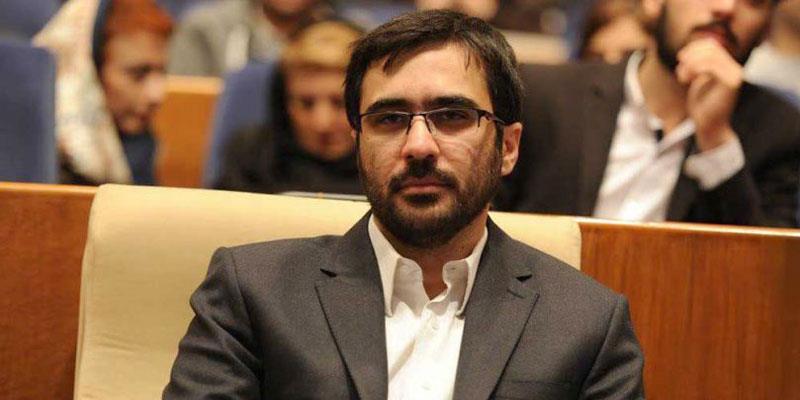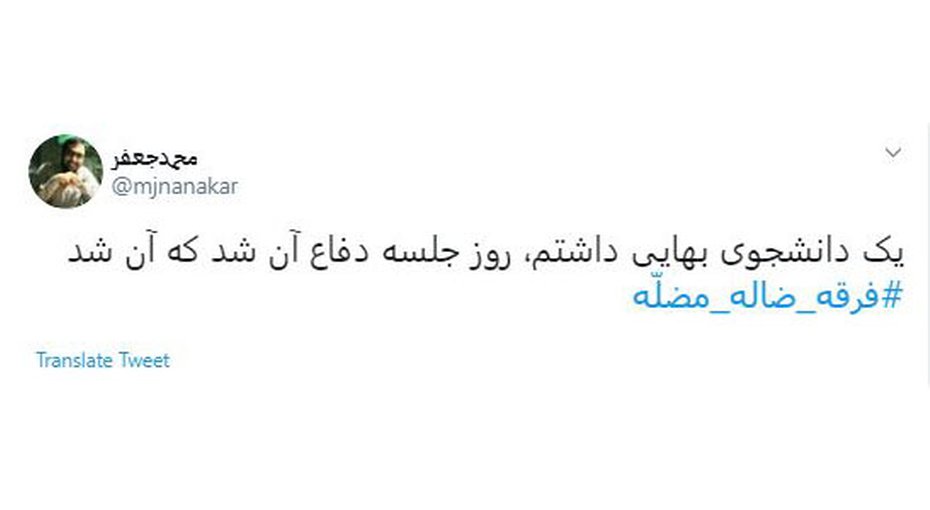Source: iranwire.com
Translation by Iran Press watch
Milad Pourissa

“I had a Baha’i student. On the day he was to defend his thesis, what should have happened, happened #deviant_misleading_cult”
This brief and vague message by a Twitter user is one of hundreds of messages against Baha’is that religious fanatics post on social media.
What they want is increased pressure on Baha’is by the Islamic Republic, and of course, they also receive a negative reaction from those citizens who support the rights of this religious minority.
What can be surmised from this user’s message is that he is a university professor, who paved the way for the expulsion of a Baha’i student on the very day he was supposed to graduate from university.
Of course, this user is not only a university professor. In the social network “Gap”, he introduces himself as “Mohammad Jafar Nanakar”, the legal director of the Information Technology organization affiliated with the Ministry of Intelligence and Information Technology in the government of Hassan Rouhani.

Who are the Responsible Parties?
Once in a while, the users who support the values of the Islamic Republic by bringing up such stories in the social media demand the expulsion of Baha’is from work and school and that these citizens be deprived of all social rights.
The anti-Baha’i policies of the Islamic Republic are often questioned by reporters at the same time the regime’s authorities, such as Mohammad Javad Zarif, are present at international assemblies.
Mohammad Javad Zarif has repeatedly denied that Baha’i citizens are deprived of their social rights and has declared that they have been banned from education or employment by the judicial system, for security violations.
The banning of Baha’is from university, school, employment, school and sports, and recent attempts to close their home for the elderly, have in most cases taken place without legal rulings.
This, of course, is not to say that the judiciary does not support this suppression of the country’s Baha’i minority. In just one case, last November, the Islamic Republic’s Court of Administrative justice upheld the expulsion of a Baha’i student, Taraneh Ghiami, from university after three years.
This Baha’i citizen had based her appeal to the appellate branch of the court on the contradiction between the regulation approved by the Supreme Council of the Cultural Revolution and the verdict issued by the preliminary Court of Administrative Justice concerning her deprivation of the right to education, and domestic laws and international documents and convention.
The confidential regulation approved in 1990 by the Supreme Council of Cultural Revolution states: “At university, either upon admission or during the course of studies, if it is established that they are Baha’is, they should be expelled.”
How to Pursue the Matter?
The experience, to date, of dozens of appeals by Baha’i citizens to the Court of Administrative Justice due to various social deprivations has shown that this judicial institution rejects appeals, based on the same letter approved by the Supreme Council of the Cultural Revolution.
Accordingly, Musa Barzin Khalifeloo, a legal expert and Iranwire consultant, believes that although the only judicial institution in the Islamic Republic with the authority to invalidate illegal verdicts is the Court of Administrative Justice, appeals to this institution lead nowhere.
Therefore, according to Mr. Barzin, the only avenue available to Baha’is to protest these decisions is through international institutions. He says: “The United Nation’s Commission on Human Rights, as the highest authority to take a stance on human rights issues in different nations, has an obligation to react to such policies.”
Regarding denials by the Islamic Republic’s Foreign Minister of pressure on Baha’is in Iran because of their religious beliefs, Musa Barzin says: “Actually it is important that in addition to condemning these cases of human rights violations in Iran, the United Nations Commission on Human Rights should respond in clear terms to Mr. Zarif’s position. The Commission on Human Rights should explicitly demand that the Islamic Republic’s authorities explain the contradictions between Zarif’s stance and the confidential guidelines approved by the Supreme Council of the Cultural Revolution.”
Javaid Rehman is the Human Right Commission’s Special Rapporteur on the situation of human rights in Iran. He can be contacted at [email protected].
Leave a Reply